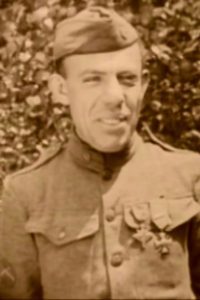
A series profiling American Jewish service in the First World War
Jack Herschkowitz
Lost Battalion Hero
Jack Herschkowitz was a Romanian immigrant working at a family grocery in New York when he was inducted into the Army on September 20, 1917. He wasn’t happy about being drafted, but was willing to do his duty. He was assigned to Company C, 308th Infantry, 77th Division. Before long, he found himself fighting in Europe. Herschkowitz was with the soon-to-be-famous Lost Battalion. While in battle in the Argonne, the group advanced too far and was caught in a pocket surrounded by Germans. Food and water were in short supply, shells were falling on the men. Conditions were deteriorating rapidly.
On September 29th, 1918, Major Charles Whittlesey assigned Private Herschkowitz as a message runner. He was to report the battalion’s position to headquarters. Along with Herschkowitz were Lieutenant Arthur McKeogh and Private Joseph Monson. The three men had to try and break through German lines amidst the difficult shelling and the enemy’s dominant position.
Private Herschkowitz’s heroism that day earned him a Distinguished Service Cross, Croix de Guerre with Palms, Medaille Militaire, and the Conspicuous Medal of New York State during World War I. His Distinguished Service Cross citation reads:
Near Binarville, France, 29 September 1918. In order to obtain ammunition and rations, Private Herschkowitz, with another soldier, accompanied an officer in an effort to reestablish communication between battalion and regimental headquarters. They were attacked by a small party of Germans, but drove them off, killing one. When night came, they crawled unknowingly into the center of a German camp, where they lay for three hours undetected. Finally discovered, they made a dash to escape. In order to protect the officer, Private Herschkowitz deliberately drew the enemy fire to himself, allowing the officer to escape. Private Herschkowitz succeeded in getting through and delivering his message the next morning.
Nearly seven decades later, Herschkowitz described his experiences to author Henry Berry. Herschkowitz believed McKeogh disliked him in an anecdote that reveals some anti-Semitic stereotyping. “He called me a button hole maker, but I wasn’t one– that means a tailor– I wasn’t a tailor.” Surely, Herschkowitz must have at least earned the officer’s respect that day. It was Herschkowitz who killed the German soldier who spotted them.
Herschkowitz related the story of being caught in the German camp: “We tried to stay quiet, but finally they saw us and we started to run in different directions. All night long, I tried to get back to our regiment– I had nothing to eat but a piece of bread I had in my gas mask… Finally, I could see these men in blue uniforms. Thank God, they were Frenchmen. They helped me get to the headquarters where I delivered my message. Oh was I lucky already!”
Extraordinarily, Herschkowitz had done all this while suffering from a serious case of the flu. His temperature reached 105. When he finally completed his mission and successfully reached headquarters, he collapsed. He would spend the rest of the war in hospitals. Unfortunately, the Lost Battalion continued to advance after Herschkowitz message was received. They cut themselves off even farther from the rest of the 77th Division.
On April 19, 1919, Herschkowitz boarded the America in Brest, France for the trip home. Before the ship left, Colonel Maurice Laurent of the French Army boarded to award the Croix de Guerre to Herschkowitz along with Benjamin Kaufman and Major George McMurtry.
Later that same year, Herschkowitz and other members of the Lost Battalion returned to Europe where they reenacted battle scenes for a Hollywood film directed by Burton L. King. The film mixed fictional characters with the men of the 77th who had actually participated including Major Charles W. Whittlesey and Abraham Krotoshinsky. King emphasized the diverse backgrounds of the men including the Jewish soldier. The Hollywood treatment certainly contributed to the fame of the Lost Battalion.
In 1921, Herschkowitz’ companion on the mission, Private John J. Monson died of tuberculosis. Monson had hit hard times since the war. He died alone in a hospital with no one to identify his body. Days had passed before it was determined that the body was Monson. When the city learned that this war hero had died in poverty, a funeral parade was arranged in his honor. The parade stretched twelve blocks. Jack Herschkowitz walked behind the remains carrying his friends’ medals.
